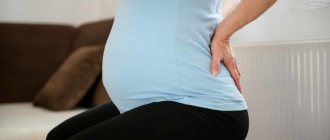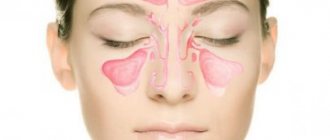A pregnant woman has to go through many tests during the period of bearing a child.
She is often tormented by toxicosis, dizziness, weakness, apathy, depression and drowsiness. But sometimes headaches during pregnancy bother you.
The frequency and intensity of such signs may vary and depend on many factors.
Often the causes are serious illnesses.
What does this symptom indicate, what are its causes, how it is formed, how to treat it and whether there are preventive measures, more about this in this article.
Causes
Headaches during pregnancy plague many women and are not uncommon.
It can signal the development of a serious illness, a disease in the brain, a consequence of venous dystonia, hypertension, problems with the spine and nervous disorders.
Main reasons:
- Hormonal imbalance. When pregnancy occurs, the expectant mother's body undergoes many changes. Among them, changes in the balance of hormones are observed. Often such signs cause a number of symptoms, among which headache is not the least important.
- Presence of hypotension. In the early stages of pregnancy, toxicosis often appears in the first trimester. It may be accompanied by a decrease in blood pressure, which leads to a headache.
- Development of hypertension. This disease manifests itself more often in the third trimester of pregnancy, when late toxicosis occurs. An increase in blood pressure is observed. Associated symptoms include swelling and the presence of protein in the urine. In this case, this indicates serious illness. This is dangerous not only for the mother’s body, but also for the fetus. At the first such symptoms, immediately report them to the doctor.
- Eating. Headaches can occur as a result of eating food that is too cold or foods that contain nitrogenous compounds. They are able to influence the condition and functionality of blood vessels. Completely exclude or reduce the consumption of chocolate products, cheeses, red wine, nuts, chicken liver, yoghurts, sausages, marinades, smoked meats and foods with preservatives.
- Starvation. Due to the small amount of food intake, headaches develop. During pregnancy, avoid long periods of time between meals. It is better to eat little, but often.
- Large body weight. Excess weight always entails unpleasant health consequences. Headache is no exception.
- Eye fatigue and staying in one position for a long time. During pregnancy, you should not work at the computer for a long time or stay in one position for a long time. You need to protect your eyesight, strength and rest more, choosing the most comfortable position.
- Development of allergies. This disorder can cause headaches in pregnant women. It is important to identify the causes of allergies and eliminate the allergen.
- Insufficient drinking regime. Drinking too little fluid leads to dehydration, resulting in headaches. During pregnancy, it is very important to drink enough water for good health and full development of the fetus.
- The influence of external stimuli. In pregnant women, all senses are greatly heightened, especially the sense of smell. With toxicosis, they cannot tolerate many odors. Because of this, they experience nausea, vomiting, and sometimes headaches. This also includes bright light and extraneous noise.
- With changes in climate conditions and the influence of weather conditions, people experience many unpleasant symptoms, including headaches. During pregnancy, these symptoms worsen.
- Depression, stress, nervous shock and unstable psycho-emotional atmosphere. All these factors influence the development of headaches during pregnancy. It is important to provide a favorable environment and atmosphere, avoiding upsets during this period.
- Lack of adequate sleep and physical stress. A pregnant woman needs to get enough sleep and not overwork. Excessive physical activity, fatigue and malaise lead to headaches.
- Sleeping a lot is also not recommended during pregnancy, as it provokes headaches. It is necessary to establish a daily routine in which sleep will be at the same time and healthy.
- An atmosphere of healthy sleep. If the climate in the room in which a woman sleeps during pregnancy is disturbed, unpleasant signs appear. Among them, headaches are common. It is important to provide all the necessary conditions for a full and healthy rest for pregnant women. Monitor humidity and air temperature, and regularly ventilate the room.
- Manifestation of various diseases. All of the above types of headaches are considered not dangerous. But it happens that the expectant mother’s chronic diseases worsen during pregnancy or pathologies appear. This leads to weakness, malaise, poor health and headaches. Severe and sudden painful symptoms should be especially alarming. It can warn about the development of serious diseases, including deterioration of blood supply to the brain, cervical osteochondrosis, kidney disease, hematoma, sinusitis, glaucoma, vegetative-vascular dystonia and meningitis. Each disease can be recognized by its accompanying symptoms. A doctor can help you make a diagnosis, so you should immediately contact him for help. He will conduct a diagnosis and refer you to a neurologist to clarify the diagnosis. Based on diagnostic data and test results, the doctor will be able to prescribe the correct treatment.
Main symptoms
When exerting, a monotonous dull pain occurs. It seems that the head is tied with a tight band. Women often say that pain spreads from the neck to the back of the head and the eye area. By palpation, pain points can be detected. Nausea is possible, but there is no vomiting. The duration of such pain is from 30 minutes to 1.5 hours.
Migraines can last up to several days. In this case, severe throbbing pain is observed in one half of the head, spreading to the eyes. The pain is accompanied by nausea, and sometimes there may be vomiting. Before an attack, there may be blurred vision, visual and auditory hallucinations, and a change in taste.
If you have problems with blood vessels, you get quite a headache and feel nauseous. Pregnancy can provoke an increase in negative symptoms. In the case of a hypertensive crisis, a feeling of heaviness in the frontal lobe, weakness, and the skin acquire a bluish tint appear.
Migraine
Migraine is considered the most common form of headache during pregnancy.
It can occur against the background of additional symptoms, including nausea, vomiting, intestinal upset, decreased vision, and pain in bright light.
Some pregnant women experience increased irritability, pain throughout the body or in the shoulder girdle, noise in the ears, headaches in the temples and cough.
Such pain is strong and throbbing. They cover one side of the head and are accompanied by the appearance of floaters in front of the eyes.
Some expectant mothers have never experienced such sensations before pregnancy, and migraines only overcome them with the onset of conception.
But it happens on the contrary, all the unpleasant symptoms associated with headaches disappear with the onset of pregnancy.
The reasons are the lack of menstruation and ovulation, which provoked headaches.
But instead, other manifestations appear that accompany the entire pregnancy.
Anemia
Another cause of headaches during pregnancy can be anemia. Every seventh woman in an interesting position has an obvious or latent iron deficiency. Anemia has very nonspecific symptoms that also appear in other diseases. We must remember that even with normal hemoglobin levels (more than 115 g/l), iron reserves in the body may be running low. To confirm hidden iron deficiency, your doctor may order additional tests.
The main signs of anemia:
- drowsiness, including during daylight hours
- morning headaches
- addiction to inedible substances (chalk, mothballs, soap)
- desire to move legs before falling asleep
- fainting in a stuffy room
- causeless low-grade fever (body temperature rises to 37.5 degrees)
- bluish tint of sclera
- deterioration in the quality of nails, hair, skin
Treatment of anemia
Once iron deficiency is detected, it is necessary to start taking iron supplements. Divalent iron in combination with ascorbic acid has the greatest effect. Some drugs (for example, Sorbifer Durules) contain a combination of these two substances. The main rule is to start treating anemia as early as possible, with the appearance of the first symptoms, without waiting for consequences for the fetus.
Treatment
To effectively eliminate unpleasant symptoms, it is important to know how to treat headaches during pregnancy.
First, it is important to determine the causes of headaches. If the provoking factor is the presence of a serious disease or pathology, immediately consult a doctor so as not to provoke serious complications.
The doctor will conduct a series of special diagnostic studies to clarify the diagnosis, and then prescribe correct and effective treatment.
If no such problems are found, you can use a number of useful tips to successfully eliminate the headache.
- If a headache appears due to stress, nervous shock or depression, be sure to stabilize the psycho-emotional sphere and eliminate all provoking factors. They provide calm conditions for pregnancy, limit communication with unpleasant people and persons who can cause negative emotions. Saturate your free time with positive energy and positive emotions.
- Compresses will improve your well-being, general condition and relieve headaches. They can be cold or warm. Apply to the forehead and back of the head, or on the neck. After a short time, a feeling of lightness appears, tension is relieved, after which the head no longer hurts.
- Take cool showers regularly. It perfectly invigorates, relieves tension and headaches. In the absence of such an opportunity, abundantly moisturizing the skin with water or simply washing and sprinkling the face will do.
- To eliminate headaches during pregnancy, a good massage is recommended. It should be done by a professional specialist. To achieve a positive result, pay attention to the head region, cervical region, back muscles and shoulder girdle.
- If you have a headache during pregnancy, be sure to pay attention to your diet and drinking regimen. It helps to relieve these symptoms by following basic rules of diet and fluid intake. All food should be healthy and rich in vitamins. Pure still water, compotes, juices and teas are suitable for drinking. Fasting or dieting for weight loss is not allowed.
Headache in the first trimester
This is a very important and responsible period, as hormonal changes in the body and the formation of fetal organs occur. Severe headaches in early pregnancy are mainly due to low blood pressure. To verify this, you just need to measure it. If the pressure is really low, then you need to drink a cup of sweet tea, preferably weak black, and lie down to rest.
If at 10 weeks of pregnancy you have a severe headache and the pain occurs frequently or even intensifies, then a consultation with a neurologist is required. This can be a sign of dangerous diseases and requires specialized treatment.
Prevention
To avoid headaches during pregnancy, you can take preventive measures.
- Provide physical activity and take walks in the fresh air. They should become a daily ritual. During walks, the necessary amount of oxygen enters the brain cells, which has an excellent effect on the condition of pregnant women. You can walk during the day or before bed.
- Ventilate the room more often. This will allow the pregnant woman to fully breathe fresh air, preventing various pain sensations, in particular headaches.
- When working at a computer or with papers for a long time, you can periodically do exercises. It will help relieve tension in the spinal, cervical and shoulder regions, and relieve pain syndromes, especially headaches.
- The expectant mother should avoid noisy companies, restaurants, shops and other crowds of people where strong noise is felt. The headache will go away if you provide peace and quiet throughout your pregnancy.
- If you have pain in the head, relaxation and yoga will help. Special exercises will relieve pain.
- The headache will go away if you change your diet. By excluding foods containing thiamine and phenylamine from the menu, you can say goodbye to such pain forever.
- In the later stages of pregnancy, avoid taking medications such as Nurofen, aspirin, and analgin.
- You can cope with pain such as headaches using non-medicinal means. The use of traditional medicine very carefully relieves many ailments.
- To properly eliminate these symptoms, seek help from a doctor. Only he can make an accurate diagnosis, prescribe appropriate treatment and suggest what to do in such a situation.
Headache in the second trimester
The likelihood of severe attacks during this period is much less likely. If you still have a severe headache at 12 weeks of pregnancy, you need to measure your blood pressure. During this period, discomfort occurs not only against the background of its decrease, but also due to its increase. If the expectant mother is weather sensitive, she may experience pain when the weather changes.
If you have a severe headache at 14 weeks of pregnancy, you can help in the same ways as in the first trimester. Namely, drink sweet tea and lie down to rest.
In what cases should you immediately consult a doctor?
In some cases, it is important to inform your doctor in a timely manner about serious health problems that accompany pregnancy.
The doctor will determine the cause and tell you how to properly treat diseases that cause pain in the head area.
What to pay attention to:
- If the headache has become regular, and its severity and nature of manifestations have changed.
- Pain in the head area immediately after waking up.
- A severe headache has developed, which is localized in the same place.
- If other symptoms appear along with the pain. These include speech, hearing, vision and sensitivity disorders.
- Painful sensations are accompanied by sharp jumps in blood pressure. Treatment is necessary for high and low blood pressure.
The expectant mother may experience pain in the head area. It is important to determine the nature of their formation, take all measures to eliminate it and consult a doctor in time.
If the symptoms do not carry any signs of pathology, they can be easily dealt with on your own.
If serious diseases are detected, all measures are taken to treat them.
You should not take medications for pain without consulting your doctor. Self-medication is harmful to the health of both the expectant mother and the developing fetus.
High blood pressure
High blood pressure, observed in every tenth pregnant woman, is a common cause of headaches. This disease can appear only after the 20th week (so-called gestational hypertension), less often in early pregnancy, or bother the woman for many years. In any case, high blood pressure is a serious reason for examination and treatment.
Diagnosis of arterial hypertension
- complaints of a pregnant woman: headache, dizziness, flashing “spots” before the eyes
- increased blood pressure above 140/90 mm Hg. column when measured twice. It is important to measure pressure correctly: after 10 minutes of absolute rest, preferably lying on your left side or sitting.
Women who:
- suffered from hypertension in previous pregnancies
- have obesity, diabetes, kidney disease
- carrying their first pregnancy
- carry a fetus with chromosomal abnormalities
Treatment of high blood pressure in a pregnant woman
If a pregnant woman has few risk factors, suffered from hypertension before week 20, a severe headache is rare, and the pressure does not exceed 140/90 mm Hg. column, then you can try to get by with non-drug treatments: reducing physical activity, eating a balanced diet and giving up bad habits. It is important to monitor your blood pressure using a diary, where the tonometer readings and well-being are recorded every day.
With a sustained increase in pressure more than 150/90 mm Hg. Art. the doctor will prescribe medications. Nifedipine and dopegit are among the few drugs approved during pregnancy. Non-drug treatments remain the same.
It is important to know that arterial hypertension and its unpleasant symptoms are not treated with a salt-free diet and restriction of fluid intake. These measures not only do not help, but sometimes provoke increased blood pressure and the development of severe complications.
What signs may indicate pregnancy?
- increased sense of smell, change in taste, morning nausea or vomiting;
- special reaction to strong odors;
- sudden changes in mood, general weakness, constant feeling of lack of sleep, inhibition of the nervous system;
- the breast enlarges, special sensitivity appears;
- frequent urge to urinate;
- darkening of the skin on the nipples;
- the appearance of scars on the chest, abdomen and thighs;
- abdominal enlargement;
- cessation of menstruation;
- Colostrum may be released.
During an examination at the antenatal clinic, the doctor will be able to confirm the pregnancy and determine its duration based on the condition of the internal genital organs. Watch a video with a specialist who will tell you how to find out if you are pregnant.
During pregnancy, signs appear about the progress of pregnancy. You can feel the baby's heartbeat and its movement. When performing an ultrasound (ultrasound examination), you can determine the sex of the child.
Pregnancy is a joyful and at the same time quite difficult state. Some women remember this condition with joy, while for others it caused a lot of trouble.
During this period, the woman’s body undergoes changes in the functioning of all its systems.
The sensations can be sudden and quite unpleasant. During pregnancy, you may experience severe headaches. How to deal with this? Can I take pills? Why and why does a headache attack occur during pregnancy?
They can also be observed in women who have not suffered from this before. Sometimes this happens in the early stages, maybe at the end or in the middle. It can be observed throughout pregnancy. There is no clear answer yet. The reasons may be varied. How to find out possible reasons?
If headaches occur quite often, you need to consult a neurologist, or maybe conduct a full medical examination. In some cases, hospital observation is recommended. Pills can be taken during pregnancy, but only as prescribed by your doctor. Another video on the topic of signs of pregnancy.











